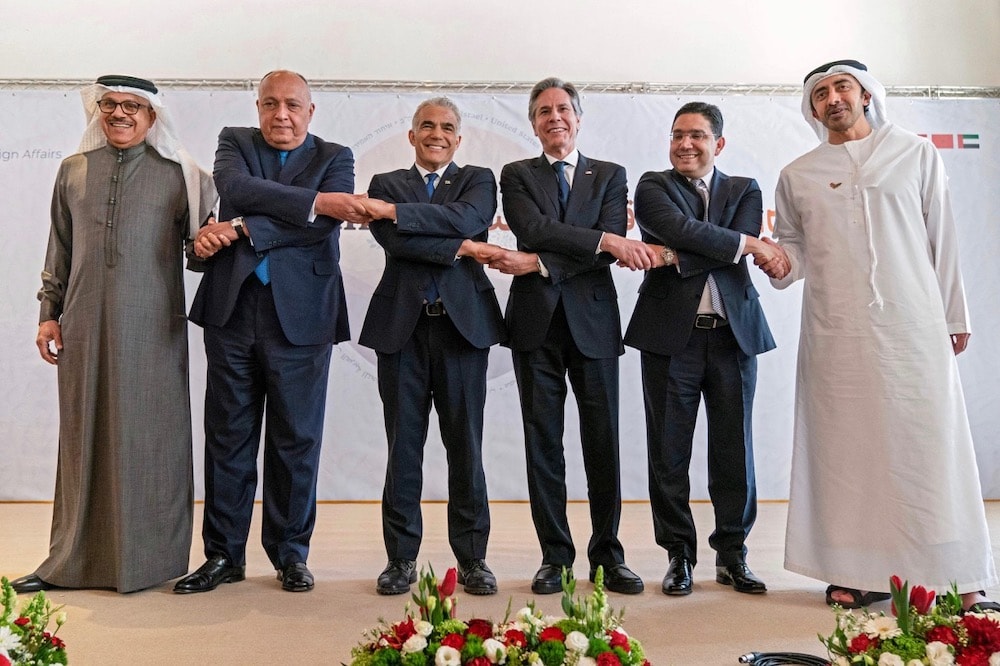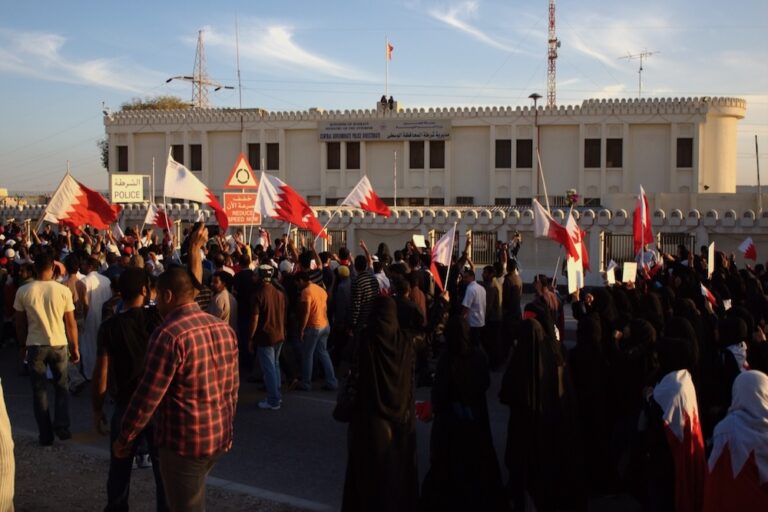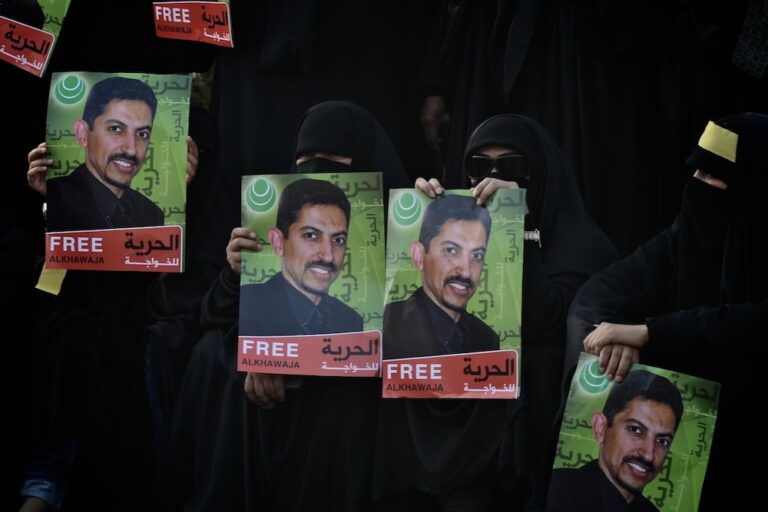So long as the US and UK governments are content to ignore the torture, unfair trials, and killing of protesters and government critics, Bahrain's monarchy will feel at ease to continue its policy of systematic repression.
This statement was originally published on adhrb.org on 12 April 2022.
“We shall continue on the path of peaceful resistance!”- Abdulhadi Al-Khawaja, founder of the Gulf Centre for Human Rights (GCHR) and former President of the Bahrain Centre for Human Rights (BCHR), upon receiving his prison sentence for peacefully exercising his fundamental freedoms during the 2011 pro-democracy movement. Al-Khawaja is currently serving a life sentence.
Statements by US and UK officials about the Bahraini monarchy’s improvements in its respect for human rights and civil liberties defies reason but balances perfectly based on political calculations. The handshaking and warm words with Bahrain’s dictators are made possible because a blind-eye has been turned to the monarchy’s legalization of systematic repression and human rights violations. Even when confronted with evidence of unrelenting human rights abuses perpetrated by the Bahrain government, the US and UK governments continue to ignore the situation. The political reforms enacted by the Bahraini government – empty of any real checks on its ability to violate and abuse its own people – are in reality, just enough cover to allow the US and UK to continue its business-as-usual with the dictators in Bahrain.
The Government of Bahrain responded to the development of a peaceful pro-democracy movement in February 2011 with unrestrained brutality, violently subduing protests through a campaign of terror that involved thousands of arbitrary arrests, hundreds of injuries, and numerous deaths. It has now been widely acknowledged that the silence of the West during the pro-democracy uprisings was largely due to the prioritization of economic and military interests over the universal obligation to protect international human rights standards. Since the 2011 pro-democracy movement, the government has escalated its efforts to dismantle Bahrain’s civil society through the systematic use of abuse to silence activists, journalists, religious officials, and political leaders. Furthermore, the government has intensified its persecution of the country’s Shia majority through a restriction of rights that has been effectuated by policies which are overtly discriminatory.
So long as the US and UK governments are content to ignore the torture, unfair trials, and killing of protesters and critics of the government, Bahrain’s monarchy will feel at ease to continue its policy of systematic repression. The actions the monarchy has taken have “not played a genuine role in improving the human rights situation in the country.” Bahrain has even “scolded” and “expelled” US diplomats who have met with Bahraini rights activists. A 2022 UN committee issued a set of recommendations to the Bahraini government that it would need to take to meet the minimum obligations it agreed to when it acceded to international human rights treaties. Many of these recommendations are the same as other recommendations made to the government since 2011.
Just six months ago a bipartisan groups of US Senators sent an official letter to Secretary Blinken precisely because of Bahrain’s “violent, systematic repression” of its people. The Senators asked Mr. Blinken what plan the administration has for pressing the government in Bahrain on its “long list of serious and ongoing human rights abuses.” The Senators explicitly sighted Bahrain’s record of arbitrary detention, cruel treatment of political prisoners, dangerous limits on the freedom of the press, restrictions on peaceful assembly, political participation, and religious practice, as well as the work and recent reports of ADHRB.
Some specific questions asked of Mr. Blinken by the Senators were: has the administration pushed the monarchy to release political prisoners, has the administration considered the monarchy’s ongoing repression and human rights abuses when evaluating weapons sales, and has it considered sanctions against members of the government responsible for human rights violations?
The concern of these Senators for Bahrain’s persistent pattern of rights violations is not limited to a moral concern; the long-term instability Bahrain creates for itself by the violent repression of its own people is a danger to US strategic interests in the region. The strategic importance of the island nation to US interests in the region and to the Navy’s 5th Fleet headquartered there elevate the significance of any action the monarchy takes. The Senators have correctly raised the concern that the monarchy’s violent repression will breed resentment and inevitable instability; the consequences of this for the US or any ally who enabled this repressive government will be a threat to the US Fifth Fleet and the several thousand sailors and Americans living in Bahrain.
Human Rights Watch has concluded in its 2021 World Report that human rights violations in Bahrain have not improved. The report notes how the government has “escalated” is suppression of online activity critical of the monarchy, how no independent media have been allowed to operate in the country, how foreign journalists and rights groups are routinely denied access, and the prosecution and imprisonment of journalists and critics. Directly refuting the claims of US and UK officials, Joe Stork, deputy Middle East director at Human Rights Watch, asserted in the 2021 report that, “Bahraini authorities use the many repressive tools available to them to silence and punish anyone who criticizes the government” and that Bahrain “has escalated its use of the death penalty, targeted people for their social media activity, and denied medical treatment to prominent opposition figures in detention.”
In its World Report 2022, Human Rights Watch asserted that “[T]en years after Bahrain’s pro-democracy uprising, the authorities have snuffed out all critical voices and severely restricted any space for opposition”. In commemoration of Bahrain’s National Day in 2021, HRW reported on the endemic mistreatment of political activists and rights defenders have been wrongfully imprisoned for more than a decade and urged Bahraini authorities to rectify these injustices by unconditionally releasing all those subjected to unfair trials following arrests for offenses that involve nothing more than the exercise of their fundamental freedoms.
Reports by ADHRB have documented the worsening reprisals faced by peaceful Bahraini members of the opposition and the escalation of the government’s targeting of children under 15 years of age, despite the issuance of the Restorative Justice Law for Children. Since 27 December 2021, six children between the ages of 14 and 15 have been detained and denied their basic rights. Many thoroughly documented cases of torture and coerced confessions used in death penalty trials against political prisoners overflow the record against the Bahraini monarchy. An example of the extremes to which the Bahraini monarchy is willing to descend in order to maintain its grasp on power are the cases of over 600 children that the monarchy has jailed under its questionable anti-terror laws. During their imprisonment these children reported police and prison officials would beat, insult, and threaten to rape them. The government has denied these all of these reports but Human Rights Watch shared a determination that these denials “lack any credibility in the face of compelling evidence, and is a blatant effort to whitewash serious human rights violations.”
As part of its Silence is King: Prisoners of conscience in the Gulf campaign in 2021, Amnesty International called attention to the efforts of the Gulf Cooperation Council (GCC) states to silence political and human rights activists and further erode the freedom of expression by means of widespread arbitrary arrests and detentions. At the time of the report’s release, Amnesty International documented at least 52 prisoners of conscience across the GCC states, and noted with emphasis the imprisonment of Abdulhadi Al-Khawaja, founder of GCHR, and Sheikh Ali Salman, former Secretary General of the country’s main opposition political party al-Wefaq, both of whom were subjected to unfair trials and abuse during their detentions and are currently serving life sentences for their peaceful activism. More recently, Amnesty International conducted an investigation in partnership with the Pegasus Project which revealed that three Bahraini activists who have voiced opinions critical of the Bahraini government, including Mohamed al-Tajer, a lawyer who represented the families of two victims who died due to torture by Bahraini security forces in 2011, were targeted with Pegasus spyware in June and September of 2021. Lynn Maalouf, Deputy Director for the Middle East and North Africa at Amnesty International, cited this as further evidence that “Bahraini authorities have pursued their crackdown on dissent in recent years, tightening their monitoring of digital media, which was the only space left for open discussion after the government outlawed the legal opposition groups”.
While U.S. and U.K. officials have chosen to ignore the violent repression and human rights abuses of the Bahraini monarchy, members of the government in France have not been so coldly calculating. French lawmakers last year, following the example of Senators in the U.S., publicly began pressuring their government to speak out against the human rights abuses perpetrated by the Bahraini government. They highlighted multiple specific cases of government attacks on pro-democracy protesters but also highlights the torture and imprisonment of Abdul Jalil al-Singace. Mr. al-Singace is a respected academic and leader from the 2011 pro-democracy protests. The government charges against him include establishing terrorist cells to overthrow the government. This is a common tactic employed by the government in its campaign to suppress dissent. Overly broad and vague anti-terror laws have allowed the government to arrest, disappear, and kill protesters and critics of the monarchy.
Despite the claims of US officials which cite the recently signed Abraham Accords as evidence of a more religiously tolerant Bahrain, individuals continue to be persecuted on the basis of sect, with the country’s Shia majority subjected to widespread restrictions on worship and forced to contend with limited social mobility. The US State Department’s 2020 Religious Freedom Report on Bahrain noted that not only did the Bahrain government continue “to question, detain, and arrest clerics and other members of the majority Shia community”, but employment discrimination against Shia, particularly within the security forces, remains commonplace and anti-Shia commentary continues to be pervasive on both social media and state-run media broadcasts.



